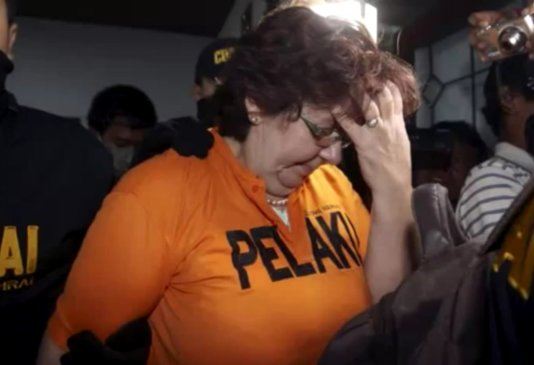- About
- Topics
- Picks
- Audio
- Story
- In-Depth
- Opinion
- News
- Donate
- Signup for our newsletterOur Editors' Best Picks.Send
Read, Debate: Engage.
| April 09, 2013 | |
|---|---|
| tags: | #drugs, #EU, #Mexico, #Portugal, #UN, #war on drugs |
| located: | Mexico, Portugal |
| by: | Jack Bicker |
Her head was stooped into her hands, her body slumped in her chair, her tear-filled eyes unable to look up at her accusers; as she received her sentence, Lindsay Sandiford looked less the broken-woman and more the image of a wretched, helpless individual literally anchored down to the floor - frightened to glance forward at the dreadful juggernaut of fate careering loudly towards her. Unless her legal appeal is successful, this 56 year-old will be lined up in front of a firing squad, and shot dead. And all for the sake of a few small packets of powder, each no bigger than a bag of sugar.
The case of Lindsay Sandiford - a middle-class western woman surrounded by a courtroom of unfamiliar faces - has garnered much international attention, but in addition to giving us an insight into the illicit trade in drugs, a more general question hangs over Ms. Sandiford's story, and indeed over all of those caught up in the world-wide war on drugs;
Is the continuing, mass destruction of lives associated with the criminalisation of drug use an appropriate price to pay for what seems an unwinnable - and at times heavy-handed - fight to rid the world of recreational substance use, and people looking for cheap ways to get high?
The answer provided by statistics is alarming;
In the US, levels of illicit substance use remain unchanged despite a 25-year war-on-drugs that has cost over $1 trillion, and resulted in over 45 million arrests. Since Mexican president Felipe Calderon deployed 50,000 troops to combat illegal drug traffickers in 2006, conservative estimates suggest that there have been over 60,000 deaths related to drug violence. Some unofficial estimates place the figure at nearer 120,000. At the end of 2011, over 500,000 of inmates in US prisons were convicted of drugs crimes. In 2010, 44.6% of all US convictions involving illegal drugs were against African-Americans, who make up only 12% of the general population). Heroine production in Afghanistan has increased by 40% since efforts to curb the industry began after the 2001 NATO invasion, $100 million dollars of which is annually reaped by terrorist organisations.
Despite the efforts made, the money spent, and the lives lost, these policies are obviously not working: the UN estimates that between 1998 and 2008, worldwide cocaine use rose by 27%, cannabis use by 8.5% and opiate use by 35%. It is becoming increasingly obvious that the War on Drugs is a war on the people whose lives, for whichever reasons, have been caught up in the back-channel chemical economy. Or as David Simon, creator of HBO series The Wire puts it, "what drugs haven't destroyed, the war on drugs has".
Politicians around the world are beginning to consider alternative approaches. A proposal laid before the EU parliament as long ago as 2002 contended that the,
"policy of prohibiting drugs, based on the UN Conventions of 1961, 1971 and 1988, is the true cause of the increasing damage that the production of, trafficking in, and sale and use of illegal substances are inflicting on whole sectors of society, on the economy and on public institutions, eroding the health, freedom and life of individuals."
Other than Portugal - which effectively legalised drug use in 2001 - other countries have been slow to take action. Recommendations in favour of some sort of decriminalisation have been made in parliaments in the UK, the Netherlands, Denmark, France, Poland, the US and many others. And yet the public image of drug usage - perhaps informed by extremes - remains such that the political appetite for any level of change remains low: nobody, it seems, wants to be the prime minister who said yes-to-drugs.
Therefore, there has never been a more timely moment in which to enter into an informed debate. Over the coming weeks, Fairplanet will ask the questions, tell the stories and scrutinize the policies, with the overarching aim asking what use is the war-on-drugs?
By copying the embed code below, you agree to adhere to our republishing guidelines.

